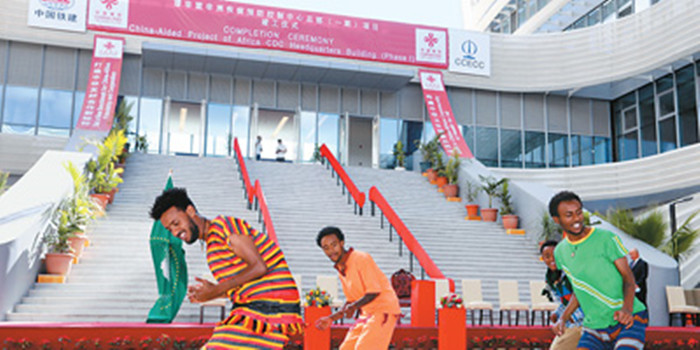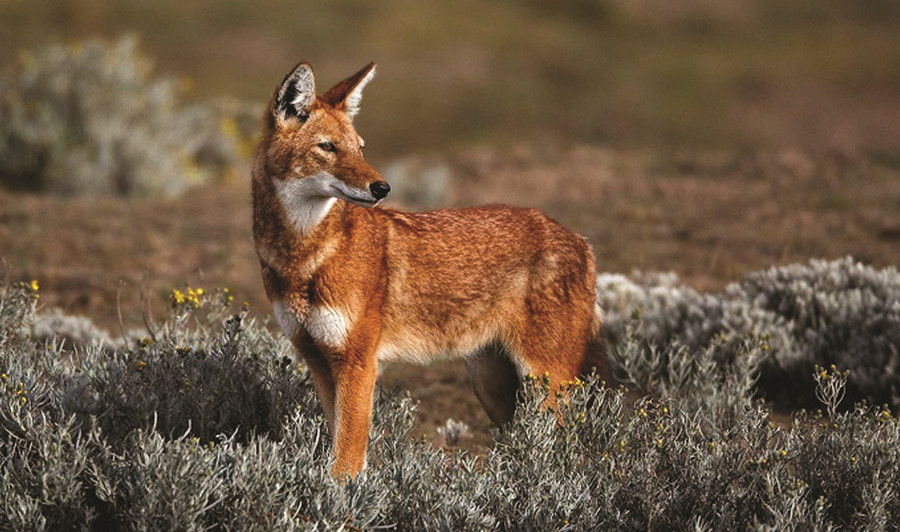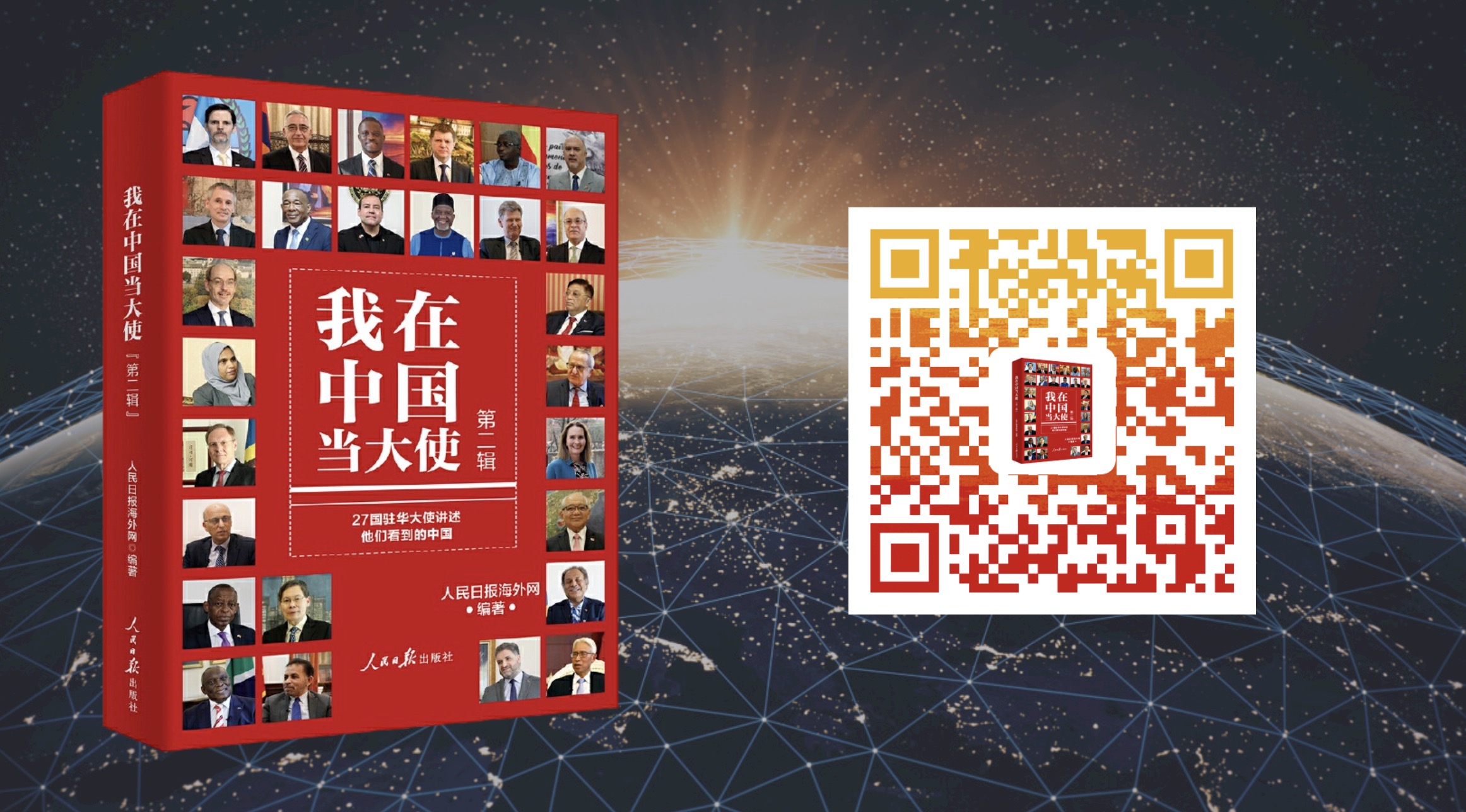
Tefera Derbew Yimam, Ambassador of Ethiopia to China (Photo by Lu Ningyuan/People's Daily)
“Within seconds, the entire stock of coffee (several tons) in the store was sold out during one of the live-streaming sales programs that my predecessor participated in,” said Tefera Derbew Yimam, the Ambassador of Ethiopia to China, in a recent interview with our newspaper. “I plan to follow his example and have been in touch with companies that offer similar live streams here. I will surely join one of those live-streaming sales in China.”
Since arriving in China in March this year, Tefera has had a tight schedule. He has many more ideas for promoting bilateral cooperation. “I hope we will see our avocados in the Chinese market in the next one or two years. Gradually, we will have more products to export to China, not just primary products. We will have manufactured products, such as textiles and leather,” Tefera said.
“Enjoying each and every bit of visits to different cities”
Tefera had visited China twice before, so he was not unfamiliar with the country, but he saw more surprises this time. “I think there are lots of things that actually impress me about China and the great advance in addressing climate issue has been really amazing. With bold policy measures and amazing implementation capacity of China, now in Beijing we have a nice clear sky every day,” Tefera said.
After coming to China, Tefera has visited 8 provinces and more than 10 cities. He said, “every city has its unique character that impresses me. The cuisine here in China is various in terms of tastes, and each and every city and province has its own cuisine. I like Beijing duck and hot pot…There are also different varieties of noodles. I think these are my favorite Chinese cuisine. You can feel the social economic dynamism everywhere you go…So I’m enjoying each and every bit of my visit to different cities and provinces…I was particularly happy to see that even in some provincial cities, I was able to meet traders, who import Ethiopian mung bean and sesame and truly distribute to their customers.”
As he walked around the streets in China, Tefera gained a deeper understanding of Chinese modernization. He believed that to appreciate Chinese modernization, one had to look back at its history. One had to consider China's ancient civilization, long history, and the values of its people. Because of these factors, the Chinese path to modernization had its own unique features. “Chinese modernization is the modernization of common prosperity for all, and it is based on the principle that no one should be left behind. That's why we can see now in China that there is an even distribution of development across the country," Tefera said.

In January of this year, the completion ceremony for the China-aided African CDC Headquarters Building Project (Phase I) was held in Addis Ababa, the capital of Ethiopia.(Photo by Dong Jianghui/Xinhua)
“The Ethiopia-Djibouti railway is the lifeline of our economy”
In Ethiopia, the Ethiopia-Djibouti railway is highly regarded. This railway, which connects Addis Ababa, Ethiopia’s capital, with Djibouti City, the capital of Djibouti, is the first cross-border electrified railway in Africa and a flagship project of China-Ethiopia Belt and Road cooperation. This year marks the fifth anniversary of the Ethiopia-Djibouti railway. Tefera vividly recalls his first train journey by the Ethiopia-Djibouti railway. “There was an old railway in Ethiopia that was established over a century ago. As a university student, I used to travel on that train every year. I would leave from Dire Dawa, a city located between Addis Ababa and Djibouti, at 6 in the evening and arrive in Addis Ababa at 6 in the morning. It took us about 12 hours. Now, the journey from Addis Ababa to Djibouti takes only 6 hours,” says Tefera. This project has not only served passengers but also supported the development of industrial parks along its route and facilitated the transportation of imported and exported goods. “This project is the lifeline of our economy.”
The Hawassa Industrial Park is the first modern light industry and textile park in Ethiopia, designed and built by Chinese enterprises. It has attracted many famous companies to set up their businesses there. “I have been to the Hawassa Industrial Park. It has created a vibrant dynamic situation in that city,” Tefera said, this park has contributed to bringing and attracting foreign direct investment in Ethiopia, created lots of jobs for the youth, contributing to Ethiopian foreign currency earning capacity. Usually, the city used to be known for its tourism station, but now at the same time, it's a vibrant economic center in Ethiopia.
“We Ethiopians are witnessing the remarkable contribution being made by the BRI. Ethiopians benefit from these projects,” Tefera said, “I think the case of Ethiopia is a valuable showcase of the BRI in Africa. The third Belt and Road Forum for International Cooperation is approaching. I think a new steam will further enhance and strengthen the initiative. The BRI will continue to influence and bring a far-reaching impact to the global community. We expect more areas of cooperation under the BRI.”

Ethiopian wolf. (Photo provided by the Embassy of Ethiopia in China)
“I can enjoy our coffee in China”
In the southern suburbs of Addis Ababa, a new landmark has emerged from what was once a wasteland. Now people take pictures there from time to time. This is the headquarters of the African CDC, completed earlier this year with China’s assistance. It is another flagship project of Sino-African cooperation, following the African Union Conference Center. This is the first CDC in Africa equipped with modern offices, experimental facilities, and state-of-the-art equipment. “The support from China in establishing the African CDC serves as an example. This support addresses the pressing needs of Africans and reflects China’s policy towards Africa,” said Tefera.
Setting up “green channels” for African agricultural products is an important step to meet the development needs of African countries. Tefera, who participated in the third China-Africa Economic and Trade Expo, is getting ready for the sixth China International Import Expo. He witnessed China’s genuine efforts to help Africa increase its exports to China. “Our coffee exports to China are growing by 27% every year,” Tefera said, “I think China is a major buyer of our coffee now. I can enjoy our coffee in Chinese coffee shops and big hotels, and I can find other agricultural products from Ethiopia in the Chinese market. We are very happy to see our products becoming more popular among Chinese consumers.”
This year, Ethiopia is invited to join the BRICS cooperation mechanism, which opens up more opportunities for cooperation between China and Ethiopia. Tefera says that the BRICS countries share the same values as the developing countries. They also have advanced technology, which is an advantage. There is huge potential in trade and investment. The BRICS have established the New Development Bank as a new source of investment and finance. “We want to improve our infrastructure and industrialization. We want to modernize our agriculture. We need to develop our tourism. We want to develop our mining sector and see progress in information technology and digital economy,” said Tefera.
By Mao Li | Haiwainet
Follow the stories of China with the ambassadors from 27 countries and explore the vast world! Scan the QR code below and order "Talk to Ambassadors (Volume 2)" right away.

责编:吴正丹